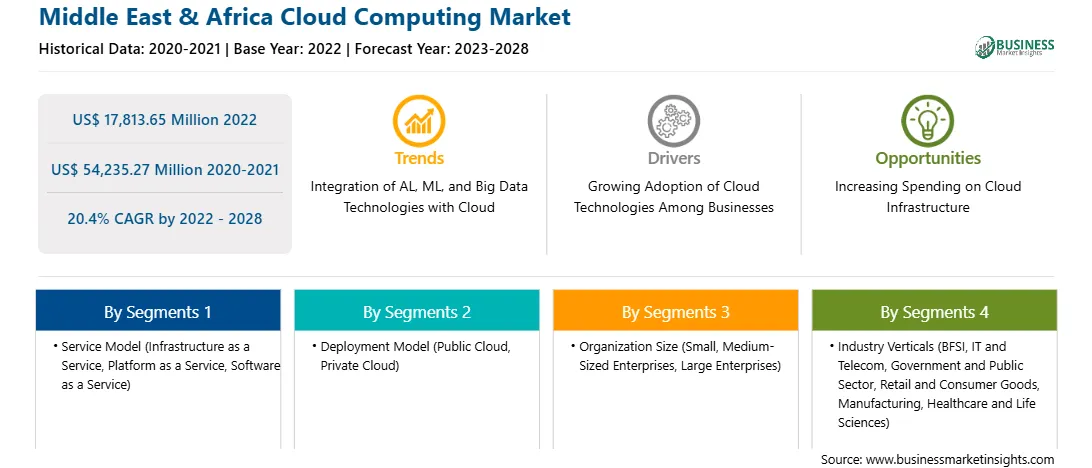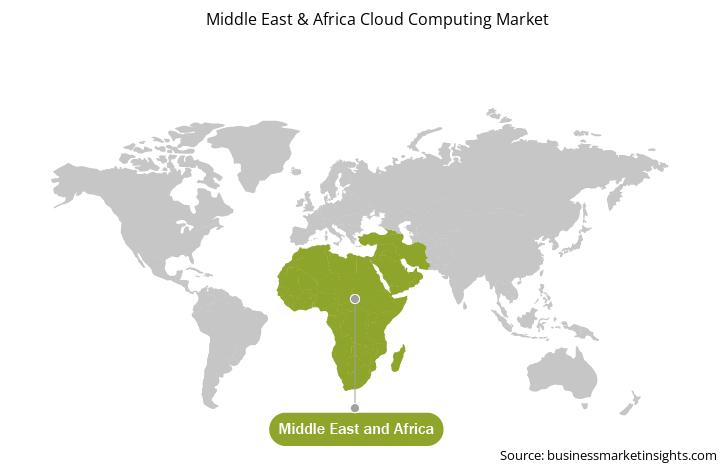Middle East & Africa Cloud Computing Market
No. of Pages: 198 | Report Code: BMIRE00026003 | Category: Technology, Media and Telecommunications
No. of Pages: 198 | Report Code: BMIRE00026003 | Category: Technology, Media and Telecommunications
The majority of organizations worldwide accept cloud services as a viable IT deployment model. The most popular rationale for cloud adoption continues to be its flexibility and data security of the cloud as a delivery platform. Many businesses have already migrated to one or more cloud services, influencing others to uptake the cloud to gain a competitive advantage. In July 2019, Amazon Web Services (AWS), Amazon’s cloud computing business, launched its cloud solutions in Bahrain, making it the first country in Middle East. Through the debut of its services in this region, the corporation hopes to tap into the technical potential of Middle Eastern businesses. Cloud is now recognized as a credible deployment model within the context of an organization’s IT strategy, with satisfaction levels remaining high and the two-thirds of end users utilizing a cloud service today expecting to expand their footprint over the next year.
By introducing new features and technologies, vendors in the Middle East & Africa cloud computing market can attract new customers and expand their footprints in emerging markets. This factor is likely to drive the market growth at a notable CAGR during the forecast period.
Strategic insights for the Middle East & Africa Cloud Computing provides data-driven analysis of the industry landscape, including current trends, key players, and regional nuances. These insights offer actionable recommendations, enabling readers to differentiate themselves from competitors by identifying untapped segments or developing unique value propositions. Leveraging data analytics, these insights help industry players anticipate the market shifts, whether investors, manufacturers, or other stakeholders. A future-oriented perspective is essential, helping stakeholders anticipate market shifts and position themselves for long-term success in this dynamic region. Ultimately, effective strategic insights empower readers to make informed decisions that drive profitability and achieve their business objectives within the market. The geographic scope of the Middle East & Africa Cloud Computing refers to the specific areas in which a business operates and competes. Understanding local distinctions, such as diverse consumer preferences (e.g., demand for specific plug types or battery backup durations), varying economic conditions, and regulatory environments, is crucial for tailoring strategies to specific markets. Businesses can expand their reach by identifying underserved areas or adapting their offerings to meet local demands. A clear market focus allows for more effective resource allocation, targeted marketing campaigns, and better positioning against local competitors, ultimately driving growth in those targeted areas.
Middle East & Africa Cloud Computing Strategic Insights

Middle East & Africa Cloud Computing Report Scope
Report Attribute
Details
Market size in 2022
US$ 17,813.65 Million
Market Size by 2028
US$ 54,235.27 Million
Global CAGR (2022 - 2028)
20.4%
Historical Data
2020-2021
Forecast period
2023-2028
Segments Covered
By Service Model
By Deployment Model
By Organization Size
By Industry Verticals
Regions and Countries Covered
Middle East and Africa
Market leaders and key company profiles
Middle East & Africa Cloud Computing Regional Insights

he Middle East & Africa cloud computing market is segmented on the basis of service model, deployment model, organization size, industry verticals, and country. Based on service model, the market is segmented into infrastructure as a service (IaaS), platform as a service (PaaS), and software as a service (SaaS). Based on deployment model, the Middle East & Africa cloud computing market is bifurcated into public cloud and private cloud. By organization size, the market is segmented into small & medium-sized enterprises (SMEs) and large enterprises. Based on industry verticals , the Middle East & Africa cloud computing market is segmented into BFSI, IT and Telecom, government and public sector, retail and consumer goods, manufacturing, healthcare and life sciences, and others. Based on country, the Middle East & Africa cloud computing market is segmented into the Saudi Arabia ,UAE , South Africa and Rest of Middle East & Africa.
Middle East & Africa Cloud Computing Market —Companies Mentioned
Amazon Web Services ; Microsoft Corporation ; SAP SE ; IBM Corporation ; Salesforce.com, inc. ; Google LLC ; Oracle Corporation ; Adobe and Workday, Inc. are a few major companies operating in the Middle East & Africa cloud computing market .
The Middle East & Africa Cloud Computing Market is valued at US$ 17,813.65 Million in 2022, it is projected to reach US$ 54,235.27 Million by 2028.
As per our report Middle East & Africa Cloud Computing Market, the market size is valued at US$ 17,813.65 Million in 2022, projecting it to reach US$ 54,235.27 Million by 2028. This translates to a CAGR of approximately 20.4% during the forecast period.
The Middle East & Africa Cloud Computing Market report typically cover these key segments-
The historic period, base year, and forecast period can vary slightly depending on the specific market research report. However, for the Middle East & Africa Cloud Computing Market report:
The Middle East & Africa Cloud Computing Market is populated by several key players, each contributing to its growth and innovation. Some of the major players include:
The Middle East & Africa Cloud Computing Market report is valuable for diverse stakeholders, including:
Essentially, anyone involved in or considering involvement in the Middle East & Africa Cloud Computing Market value chain can benefit from the information contained in a comprehensive market report.